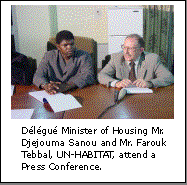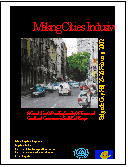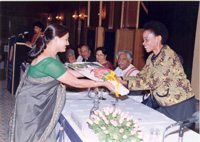World Urban Forum: Campaign Highlights
 The
Urban Governance Campaign organised a number of important events
during the World Urban Forum. On 28 April, the Urban Governance
Campaign's Global Steering Group met to review progerss and discuss
future plans (see Steering Group Report). The Campaign
also organised the "Dialogue on the Right to the City"
on the first day of the Forum, which generated a lively debate on
the issues of globalization, markets and rights, social exclusion
and corruption (see Right
to the City Report). An informal expert group meeting was held
to review the Campaign's proposal for developing an Index of Good
Urban Governance, from which many useful comments were generated
(see Index Report).
A working meeting on participatory budgeting was also held to clarify
the Campaign's strategy for the coming year (see Participatory
Budgeting Report). In addition, numerous side meetings were
also held on such subjects as national and regional campaigns, the
Transparency Toolkit, new training initiatives, and collaboration
with other partners. The
Urban Governance Campaign organised a number of important events
during the World Urban Forum. On 28 April, the Urban Governance
Campaign's Global Steering Group met to review progerss and discuss
future plans (see Steering Group Report). The Campaign
also organised the "Dialogue on the Right to the City"
on the first day of the Forum, which generated a lively debate on
the issues of globalization, markets and rights, social exclusion
and corruption (see Right
to the City Report). An informal expert group meeting was held
to review the Campaign's proposal for developing an Index of Good
Urban Governance, from which many useful comments were generated
(see Index Report).
A working meeting on participatory budgeting was also held to clarify
the Campaign's strategy for the coming year (see Participatory
Budgeting Report). In addition, numerous side meetings were
also held on such subjects as national and regional campaigns, the
Transparency Toolkit, new training initiatives, and collaboration
with other partners.
Dialogue on ōThe Right to the Cityö at the World Urban Forum, 29 April 2002.The
 The first session of
the World Urban Forum, will be held at the UN-HABITAT Headquarters in Nairobi
between 29 April and 3 May 2002. The Global Campaign on Urban Governance is
organizing one of the ForumÆs "Dialogues". "The Right to the City" has been
chosen as theme for this Dialogue, building on the debate started at the 2001
World Social Forum in Porto Alegre, Brazil. The topic of ōthe right to the cityö
serves as an entry point for several important urban governance issues: social
exclusion and urban poverty; relationship between growth and equity;
transparency in urban governance; access to urban decision-making and services;
and the tension between individual rights and collective rights and
responsibilities. The ōCity Statuteö a piece of new and progressive Brazilian
legislation, is a practical example of promoting the ōright to the cityö,
explicitly recognising this right and proposing a combination of tenure
regularisation policies, participatory management strategies and inclusive
planning mechanisms. It is suggested that "the right to the city" should be
understood not only as a political notion, but also as a legal notion, because
strategies of urban management that are not based on a solid legal framework are
unlikely to be fully sustainable.
The first session of
the World Urban Forum, will be held at the UN-HABITAT Headquarters in Nairobi
between 29 April and 3 May 2002. The Global Campaign on Urban Governance is
organizing one of the ForumÆs "Dialogues". "The Right to the City" has been
chosen as theme for this Dialogue, building on the debate started at the 2001
World Social Forum in Porto Alegre, Brazil. The topic of ōthe right to the cityö
serves as an entry point for several important urban governance issues: social
exclusion and urban poverty; relationship between growth and equity;
transparency in urban governance; access to urban decision-making and services;
and the tension between individual rights and collective rights and
responsibilities. The ōCity Statuteö a piece of new and progressive Brazilian
legislation, is a practical example of promoting the ōright to the cityö,
explicitly recognising this right and proposing a combination of tenure
regularisation policies, participatory management strategies and inclusive
planning mechanisms. It is suggested that "the right to the city" should be
understood not only as a political notion, but also as a legal notion, because
strategies of urban management that are not based on a solid legal framework are
unlikely to be fully sustainable.
Go to the World Urban Forum Website
Campaign
Launch Preparations Reviewed in Burkina Faso, 12-15 March 2002
 A UN-HABITAT mission was undertaken to Burkina Faso (12-15
March 2002) to assess the status of preparations for the launch of the Secure
Tenure and Urban Governance Campaigns.
This reflects a growing trend to launch both campaigns simultaneously in
countries where shelter and urban governance issues emerge as clear priorities.
The team found that while the entry point for the two campaigns is clearly
related to land and housing issues, however, there is a strong governance
component to these issues, particularly regarding transparency and public
participation in decision-making/development.
The team was impressed by the level of understanding of urban issues in
the country, the ōmanageableö nature of most of OuagadougouÆs informal
settlements, and the quality of the civil society organisations met.
Many donors highlighted the need for a
national coordinating mechanisms for the urban sector and expressed their
willingness to participate in such an ōurban forum.ö A group of local consultants has now
completed their draft situation analysis of urban governance and secure tenure
issues and initiatives in the country.UN-HABITAT will comment on this report and monitor the outcome of the
upcoming Parliamentary elections.For
more information, please contact: governance@unhabitat.org A UN-HABITAT mission was undertaken to Burkina Faso (12-15
March 2002) to assess the status of preparations for the launch of the Secure
Tenure and Urban Governance Campaigns.
This reflects a growing trend to launch both campaigns simultaneously in
countries where shelter and urban governance issues emerge as clear priorities.
The team found that while the entry point for the two campaigns is clearly
related to land and housing issues, however, there is a strong governance
component to these issues, particularly regarding transparency and public
participation in decision-making/development.
The team was impressed by the level of understanding of urban issues in
the country, the ōmanageableö nature of most of OuagadougouÆs informal
settlements, and the quality of the civil society organisations met.
Many donors highlighted the need for a
national coordinating mechanisms for the urban sector and expressed their
willingness to participate in such an ōurban forum.ö A group of local consultants has now
completed their draft situation analysis of urban governance and secure tenure
issues and initiatives in the country.UN-HABITAT will comment on this report and monitor the outcome of the
upcoming Parliamentary elections.For
more information, please contact: governance@unhabitat.org
Making Cities Inclusive Workshop in Belgrade, 25-26 February 2002.
 "Making
Cities Inclusive" was a two-day consultation which took place on the 25th and
26th of February 2002 in Belgrade.The
consultation involved over 70 housing and local governance experts,
representatives from local governments and civil society from Albania, Bosnia
and Herzegovina, Bulgaria, Croatia, Former Yugoslav Republic of Macedonia,
Romania, and the Federal Republic of Yugoslavia.
The meeting was organized by UN-HABITAT, the
Council of Europe and Council of Europe Development Bank, the Ministry of Urban
Planning and Construction, Ministry of International Economic Relations, the
City of Belgrade and the Standing Conference of Cities and Towns of Yugoslavia.
It sought to address key issues in the field of local governance, housing and
security of tenure across South East Europe. The consultation discussed
approaches to building responsive institutions, management systems and services
compatible with internationally recognised best practices, legal instruments and
European Union standards in both housing and local governance. Regional
representatives agreed to strengthen cooperation across the region through the
formation of expert networks which promote regional solutions to local
challenges. Efforts are now under way by a variety of multilateral institutions,
including: the Council of Europe, Council of Europe Development Bank, the
Stability Pact for South East Europe and UN-HABITAT to support initiatives by
housing and local governance experts, local and national government officials
and civil society to make cities inclusive.For a summary of the main findings and recommendations made by the
participants please see the Summary of Consultation Findings. A document
summarising the conference proceedings will be published and disseminated by the
end of April 2002. "Making
Cities Inclusive" was a two-day consultation which took place on the 25th and
26th of February 2002 in Belgrade.The
consultation involved over 70 housing and local governance experts,
representatives from local governments and civil society from Albania, Bosnia
and Herzegovina, Bulgaria, Croatia, Former Yugoslav Republic of Macedonia,
Romania, and the Federal Republic of Yugoslavia.
The meeting was organized by UN-HABITAT, the
Council of Europe and Council of Europe Development Bank, the Ministry of Urban
Planning and Construction, Ministry of International Economic Relations, the
City of Belgrade and the Standing Conference of Cities and Towns of Yugoslavia.
It sought to address key issues in the field of local governance, housing and
security of tenure across South East Europe. The consultation discussed
approaches to building responsive institutions, management systems and services
compatible with internationally recognised best practices, legal instruments and
European Union standards in both housing and local governance. Regional
representatives agreed to strengthen cooperation across the region through the
formation of expert networks which promote regional solutions to local
challenges. Efforts are now under way by a variety of multilateral institutions,
including: the Council of Europe, Council of Europe Development Bank, the
Stability Pact for South East Europe and UN-HABITAT to support initiatives by
housing and local governance experts, local and national government officials
and civil society to make cities inclusive.For a summary of the main findings and recommendations made by the
participants please see the Summary of Consultation Findings. A document
summarising the conference proceedings will be published and disseminated by the
end of April 2002.
Philippine Urban Forum Prepares National Launch for June 2002
 A campaign strategy was established for the Philippines, following intensive
consultations with key actors, including the Housing and Urban Development
Coordinating Council (HUDCC), the Local Government Ministry (DILG), the League
of Cities of the Philippines (LCP), the League of Municipalities of the
Philippines (LMP), and various external support agencies. The Philippines
Campaign will also tie into a second series of City Development Strategies being
prepared with the support of the Cities
Alliance. Under the theme ō10-10-10ö a ōcampaign for local autonomyö has
been launched on 10 October 2001, marking the ten-year anniversary of the
enactment of the Philippines Local Government Code. This was followed by a
series of roundtable discussions on aspects of good urban governance in various
parts of the country, within the broad thematic framework of ōPoverty Reduction
through Improved Governanceö. In parallel, a ōHousing and Urban Development
Summitö on 24 October 2001 has paved the way to Secure Tenure Campaign
preparations. A campaign strategy was established for the Philippines, following intensive
consultations with key actors, including the Housing and Urban Development
Coordinating Council (HUDCC), the Local Government Ministry (DILG), the League
of Cities of the Philippines (LCP), the League of Municipalities of the
Philippines (LMP), and various external support agencies. The Philippines
Campaign will also tie into a second series of City Development Strategies being
prepared with the support of the Cities
Alliance. Under the theme ō10-10-10ö a ōcampaign for local autonomyö has
been launched on 10 October 2001, marking the ten-year anniversary of the
enactment of the Philippines Local Government Code. This was followed by a
series of roundtable discussions on aspects of good urban governance in various
parts of the country, within the broad thematic framework of ōPoverty Reduction
through Improved Governanceö. In parallel, a ōHousing and Urban Development
Summitö on 24 October 2001 has paved the way to Secure Tenure Campaign
preparations.
Both events
and their follow up will lead to a joint campaign launch in the Philippines in
June 2002. The recently created Philippine Urban Forum (PUF) is acting as a
launching pad for both campaigns.As a
mechanism for continuing consultation and convergence amongst stakeholders in
shelter and urban governance, the PUF encourages debate on the localization of
principles of good urban governance and on mechanisms for securing tenure for
the urban poor communities. Six proposals for campaign follow-up initiatives
have already been developed by the Galing Pook Foundation, the Centre for
Community Journalism and Development, the National College of Public
Administration and Governance, the Local Government Academy of DILG, the
Partnership for Philippine Support Service Agencies and the League of Cities of
the Philippines. These proposals cover areas such as awarding good urban
governance initiatives, media mobilization, measuring progress in governance in
Philippine cities, capacity building for urban managers, and support to city
level action plans.For more
information, please visit:
http://www2.mozcom.com/~ndcn/Html/
India Campaign Follow-up: State Level Launches
Under Preparation
 The recommendations for action adopted at the launch of
the Indian Campaign propose a range of measures to improve selected components
of urban governance. The Minister of Urban Development and Poverty Alleviation
made a commitment to hold ōState Level Good Urban Governance Summitsö as part of
the national action plan, in line with the specific priorities of individual
States. Considerable donor interest was expressed in supporting the
implementation of the specific aspects of the action plan for particular States
and UN-HABITAT is actively following up. As a result, State level good urban
governance summits are now being prepared. In Madhya Pradesh urban governance
improvement priorities of the six largest urban areas will be integrated in a
State level action plan for good urban governance, incorporating strategic
capacity building activities. The Commonwealth
Local Government Forum (CLGF) has
committed to orient their sub-regional strategy towards the implementation of
the campaignÆs action plan, with particular emphasis on institution building of
change agents at the State level.For
more information, please visit the India Campaign Website. The recommendations for action adopted at the launch of
the Indian Campaign propose a range of measures to improve selected components
of urban governance. The Minister of Urban Development and Poverty Alleviation
made a commitment to hold ōState Level Good Urban Governance Summitsö as part of
the national action plan, in line with the specific priorities of individual
States. Considerable donor interest was expressed in supporting the
implementation of the specific aspects of the action plan for particular States
and UN-HABITAT is actively following up. As a result, State level good urban
governance summits are now being prepared. In Madhya Pradesh urban governance
improvement priorities of the six largest urban areas will be integrated in a
State level action plan for good urban governance, incorporating strategic
capacity building activities. The Commonwealth
Local Government Forum (CLGF) has
committed to orient their sub-regional strategy towards the implementation of
the campaignÆs action plan, with particular emphasis on institution building of
change agents at the State level.For
more information, please visit the India Campaign Website.
Indonesian Version of UN-HABITAT Toolkit for Participatory Urban Decision Making
 The UNDP/UN-HABITAT programme BUILD has over the past two to three years supported
nine cities across Indonesia to make changes in municipal management and
administration, focusing on introducing more responsive, participative,
transparent and accountable management practices. Another eleven cities have
recently joined the program and will introduce similar practices in their
administration over the year 2002. The UNDP/UN-HABITAT programme BUILD has over the past two to three years supported
nine cities across Indonesia to make changes in municipal management and
administration, focusing on introducing more responsive, participative,
transparent and accountable management practices. Another eleven cities have
recently joined the program and will introduce similar practices in their
administration over the year 2002.
In 2002 the
BUILD programme entered into its consolidation and institutionalisation phase.
This implies the documentation and dissemination of the examples of good local
governance in the BUILD cities as well as of the guidelines, manuals and
training material used to introduce that change and of the model regulations,
model charters and other instruments that institutionalises these
changes.
As one of
the steps to support Indonesia urban managers, the UN-HABITAT Toolkit for
Participatory Urban Decision Making was translated into Indonesian after which
specific experiences and tools used by BUILD cities will be
included.
For more information, please email gg@goodgovernance.or.id
Launch of the Indian Campaign for Good Urban Governance.
 On 3
September 2001, the Government of India and UN-HABITAT jointly launched
a national campaign for good urban governance. On 3
September 2001, the Government of India and UN-HABITAT jointly launched
a national campaign for good urban governance.
In the picture, UN-HABITAT Executive-Director, Mrs. Anna Tibaijuka receives a
welcoming bouquet during the campaign launch ceremony. Mr. Bandaru Dattatreya,
Minister of State for Urban Development and Poverty Alleviation, Government of India, looks on.
Go to the Press
Release. For more information, please visit the India
Campaign Website.
Toolkit for Participatory Urban Decision-Making Released.
 The Toolkit is the first in a series of tools to help local authorities and
their partners improve the quality of urban governance. The Toolkit responds
to the demand by practitioners for support in applying participatory approaches
to urban planning and management. It synthesizes 15 years of UN-HABITAT
experience of working in partnership with cities and confirms that civic
engagement is perhaps the key ingredient for good urban governance. Go
to the Toolkit.
The Toolkit is the first in a series of tools to help local authorities and
their partners improve the quality of urban governance. The Toolkit responds
to the demand by practitioners for support in applying participatory approaches
to urban planning and management. It synthesizes 15 years of UN-HABITAT
experience of working in partnership with cities and confirms that civic
engagement is perhaps the key ingredient for good urban governance. Go
to the Toolkit.
Global Steering Group Meeting, June 2001, Brooklyn, New York.
The
Huairou Commission hosted the Global Campaign Steering Group meeting in
New York on 9 June 2001.Go to the Global Steering Group meeting minutes.
Habitat and IULA Launch Two Publications on Women and Urban Governance.
 UN-HABITAT and the
International Union of Local Authorities jointly launched
two UN-HABITAT and the
International Union of Local Authorities jointly launched
two  publications promoting the roles and issues of women in local government
at the IULA/UTO Unity Congress in Rio de Janeiro, Brazil, in May 2001.
Go to the UN-HABITAT publication. Go to the IULA publication. publications promoting the roles and issues of women in local government
at the IULA/UTO Unity Congress in Rio de Janeiro, Brazil, in May 2001.
Go to the UN-HABITAT publication. Go to the IULA publication.
President Obasanjo Launches Nigerian Campaign for Good Urban Governance.

|
His Excellency, President Olusegun Obasanjo, President of the Federal Republic
of Nigeria, launched the Nigerian Campaign for Good Urban Governance on
10 April 2001. Go to the Press
Release. Go to the Nigerian Campaign Documents.
|
Transparency International and Habitat to Collaborate on Tools for
Good Urban Governance.
  In a Memorandum of Understanding signed in Bremen
by Peter Eigen, Chairman of Transparency International, and Anna Tibaijuka,
Executive Director of UN-HABITAT, the organisations agreed to develop a
toolkit to build capacity for greater transparency and accountability in
local government. For more information, go to the press release. In a Memorandum of Understanding signed in Bremen
by Peter Eigen, Chairman of Transparency International, and Anna Tibaijuka,
Executive Director of UN-HABITAT, the organisations agreed to develop a
toolkit to build capacity for greater transparency and accountability in
local government. For more information, go to the press release.
For more information, please contact:
Global Campaign on Urban Governance
UN-HABITAT
P.O. Box 30030, Nairobi, Kenya
Tel: (254-2) 623216, Fax: (254-2) 624264
E-mail: governance@unhabitat.org
Website: http://www.unhabitat.org/governance
|



